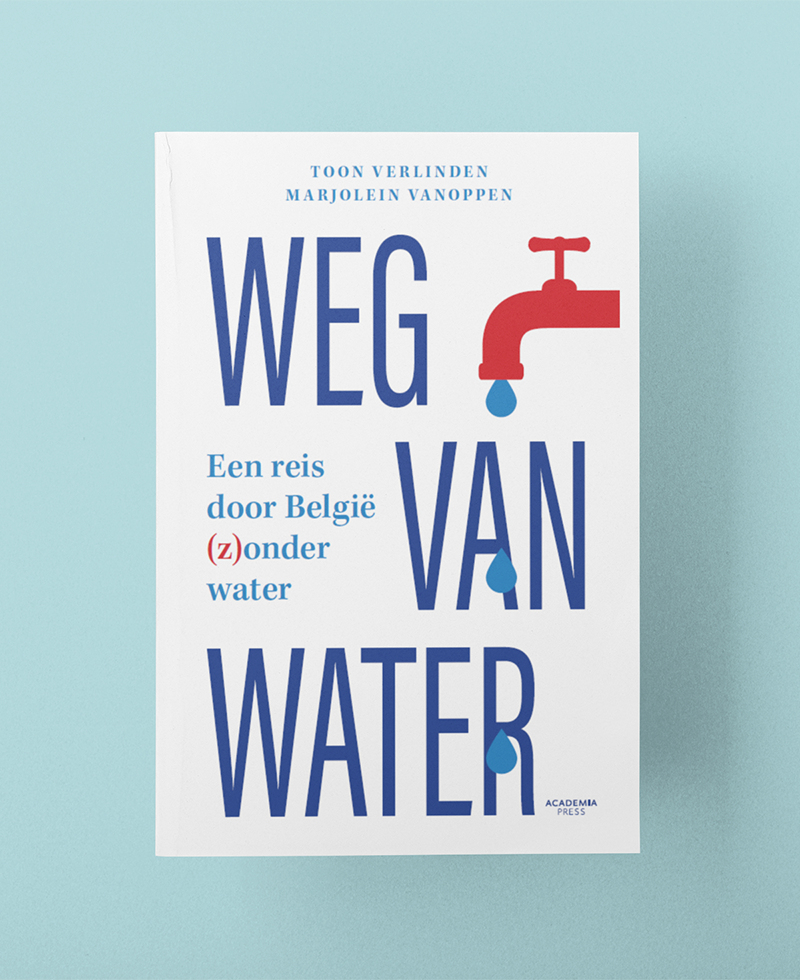Three golden tips for solid science communication
The book Weg van Water (Dutch) recently hit the stores. I (Toon) wrote it together with water researcher Marjolein Vanoppen and boy are we proud of it!
Writing this book was hard work at times, but along the way I learned plenty of useful things about science communication. I would love to share the 3 most useful insights with you.
But first, let me tell you that the book is about the water that comes out of your tap. What do you know about that water? Where does it come from and where does it go? And how long will it continue to flow out of the tap?
We go on a journey with divers swimming in sewers and with farmers squeezing the last drops of water out of manure. We look at Mars, dig a sand castle in Ostend, and drink a very special glass of water in Kuurne. And along the way we discover that our rainy country is in fact much drier than we think.
Ready for the insights?
1. Stories, stories, stories. But where do you find them?
Science communication thrives on stories. Your first task is to look for stories to which you can link your knowledge and interesting facts and thoughts.
The experts you talk to are an important source for this, but – and here is the catch – the experts themselves are often not aware of their own amazing stories. The question ‘why don’t you tell me a fascinating anecdote‘ rarely gets you anywhere.
Dare to dig deeper, even if you risk asking stupid questions. Once, I was talking to someone who coordinates sewer maintenance. Somewhere along our conversation he mentioned that at times he calls in the help of divers. He passed over it so quickly that it almost didn’t register with me. Until I turned to my notes. Wait a minute, divers? In our sewers? Tell me more! And there, of course, was my story.
Did you know that divers are hired to swim in our sewers and wastewater treatment plants? That those people literally dive into shit, navigating blindly in the dark, in order to recover stalled pumps or lost laptops? Now there’s a story. But my conversation partner didn’t see it that way. He didn’t think it was all that special and I would’ve never picked up on it if I hadn’t dug deeper.
Second story tip: when you have a story like this, link it to an existing person. It is one thing to say there are divers swimming in our sewers. It is another thing to speak to that diver and join him on his rounds. Billy the diver is real. Make your stories concrete.
2. No, really?
In your research and conversations, look for the interesting facts and stories that even make you think “No, really? Look for the items that amaze you, that you would want to share with your friends or family. The added challenge? Often those facts are obvious to experts. It is your job to pick up on them.
For example:
- Did you know that in many of Belgium’s coastal towns tap water comes from the Ardennes?
- Did you know that Belgium has as little water available as Mexico and Morocco?
- Did you know that the water in your glass is billions of years old? That a dinosaur probably once peed in it or a whale vomited in it?
- Did you know that we have only been treating Brussels’ wastewater on a large scale since 2007? Before that, the wastewater of the more than one million Brussels residents flowed straight into the river Senne.
- Do you drink tap water in the Kempen region (and large parts of Limburg)? Then there is a good chance that you are drinking rain that fell during the First World War.
Those facts propel your audience forward. Present them together with fascinating stories and solid scientific data and your chapter will practically write itself (although, the writing is still an awful amount of work).
3. Find a partner
A constant factor in each of my science communication activities is that I always work alongside a partner I can rely on.
- The Floor is Yours? I would not be able to do this without Hans Van de Water.
- Sound of Science festival? Wouldn’t be able to do it without the help of Hetty Helsmoortel.
- The book Weg van Water? Impossible without the input, advice and support of Marjolein Vanoppen (who also creates the excellent water podcast Helder (Dutch)).
Find a partner to work alongside. Bounce ideas off each other, ask for honest criticism, and allow the other person to step in whenever you need a break.
As for our water book, Marjolein’s expertise and background allowed me to just keep writing. Whenever I needed a contact person somewhere, she would put me in touch with them. If something was unclear to me, she explained it. And if anything was missing, immediately she would provide it.
A good partner is truly worth their weight in gold when you’re communicating with scientists. And it is so much more fun than working alone.
Do you have any other tips? Share them with us!
